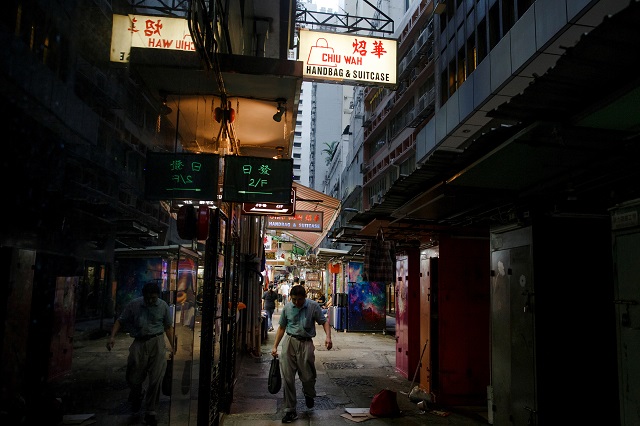
The world's biggest equity deal this year was to unfold in Hong Kong later this month but has been put on hold. Banks are issuing unprecedented profit warnings, while hotels and restaurants are half-empty.
Several global events have been postponed and economists say retail sales could drop by 20%-30% this year.
Hong Kong is facing its first recession in a decade, with all its growth pillars under significant stress. While protesters are disrupting day-to-day activities, Beijing has displayed its paramilitary might near the border, raising questions over the city's political, financial and
economic future.
"Hong Kong is facing a crisis almost unprecedented in its history," said Edison Lee, equities analyst at Jefferies. In the April-June quarter, when the impact of the protests was mild, the economy shrank 0.4 per cent from the previous quarter.
Since then, demonstrations have spread across the territory, disrupting traffic, paralysing shopping and tourist areas and closing down the city's sprawling airport at times.
The third quarter is bound to confirm the recession by its technical definition of two consecutive quarters of economic contraction. For the whole year, the government expects growth at 0-1%, but some analysts expect it to shrink.
Forecasting at this juncture, given the myriad of pathways the social crisis might take, is of little value, but the contraction could be severe.
"When you have a boom for so many years, and now you get a bust, the bust is going to be quite massive also," said Kevin Lai, chief economist for Asia ex-Japan at Daiwa Capital Markets.
CORPORATE WARNINGS
Citing political unrest, China's biggest e-commerce company Alibaba Group Holding Ltd has delayed its up to $15 billion listings in Hong Kong, two people with knowledge of the matter told Reuters earlier this week.
Bank of East Asia, after reporting a 75% plunge in first-half net profit due to writedowns in China, warned on Wednesday about the impact further protests could have on small and medium enterprises.
More than 20 other companies, including developer Henderson Land, hotel group Shangri-La Asia, Emperor Watch & Jewellery, department store operator Lifestyle International and rail operator MTR Corp, said in recent earnings reports the protests have been damaging.
The Catering and Hotel Industries Employees General Union told Reuters employers had asked some of its members to take non-paid leave this month because of the downturn in business.
Yiu Si-wing, Chairman of China Travel Service (HK) Ltd, a major mainland tour operator, said revenue from room sales was set to plunge 50% in August.
"Visits from mainland China that usually account for 80% of arrivals are down most as people fear for their safety," Yiu told Reuters.
Organisers of several conferences and exhibitions are scrambling to postpone events. Trade representatives of the world's largest diamond trading centres have asked the organiser of the Hong Kong Jewellery and Gem Fair to postpone the high-profile event, which typically welcomes more than 54,000 visitors.
The fair is due to be held in September. BlackRock Inc, the world's largest asset manager, has postponed a two-day September conference at the Four Seasons Hotel until February "so that as many partners as possible from across Asia are able to join."
On Thursday, the Hong Kong Retail Management Association, which represents more than 8,000 businesses, urged all landlords to halve rents for six months and warned if the situation continued "many retailers may have to sack staff".
HANDS TIED
Hong Kong leader Carrie Lam has repeatedly warned that protests are hurting the economy. She has consistently declined to meet any of the protesters' core demands.
Instead, this month, she announced stimulus measures worth $2.4 billion, from subsidies for education and utilities to loan relief for small businesses.
But analysts warn that in the current climate, handouts are ineffective as firms and consumers are in no mood to spend. With no obvious infrastructure upgrades needed, and with the government having a long track record of failing to adequately boost housing supply, analysts only expect announcements of more handouts and tax breaks at Lam's annual policy address in October.
Since the turn of the century, every time Hong Kong's economy got in trouble, the mainland's economic boom or its stimulus measures came to the rescue.
Now Beijing is facing its sharpest slowdown in nearly three decades and record debt.
"Hong Kong is on its own this time," said Tommy Wu, senior economist at Oxford Economics.
GRIM FUTURE
Rating agencies have raised long-term questions over the quality of Hong Kong's governance. But an increasingly assertive Beijing is fuelling larger concerns.
Mainland regulatory scrutiny on airline Cathay Pacific over the involvement of some of its employees in the protests will affect Hong Kong's image as a safe place for business.
A 1992 US-Hong Kong Policy Act allowing Washington to have a different customs regime with Hong Kong than with mainland China is also crucial for economic stability.
For it to stand, US authorities need to see Hong Kong as sufficiently independent from Beijing, therefore movements of mainland troops at the border in Shenzhen are worrying. But for now, the uncertainty is disruptive enough.
"The social situation tugs at all our heartstrings," Kaisun Holdings, an investment holding company, said in a statement.
"Many investors have chosen to leave Hong Kong, and some banks and [multinationals] have started planning on moving their base to other nearby Asian cities. Kaisun Holdings may also begin to look for alternative markets for some of our service-based businesses."










1730884134-0/BeFunky-collage-(26)1730884134-0-270x192.webp)






COMMENTS
Comments are moderated and generally will be posted if they are on-topic and not abusive.
For more information, please see our Comments FAQ